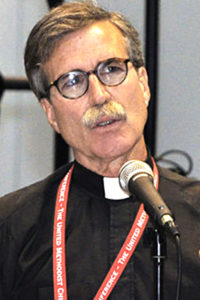Overcoming Apathy and Opposition in the Church
The 2023 National Right to Life Convention was held on June 23-24 at the Hyatt Regency/Pittsburgh International Airport. On the opening day, Rev. John B. Brown, Jr.–author of Lilies That Fester: Abortion and the Scandal of Christian Discipleship (Resource Publications, an Imprint of Wipf and Stock, 2022)–and I co-led a seminar entitled “Overcoming Apathy and Opposition to Pro-Life Efforts in Christian Denominations.”
It was not surprising that two Protestant ministers were asked to lead this workshop. Convention planners probably provided it for Protestants who belong to congregations and denominations that are more or less pro-choice. What Rev. Brown and I discovered was that not only pro-life Protestants but also pro-life Catholics encounter opposition in their Christian communities.
During my half of the seminar, I presented “Ten Things to Remember,” my attempt to inform and encourage the pro-life Protestants and Catholics in the room. Here’s what I told them:
1. First, last, and always, trust and obey the Jesus Christ of the Crucifixion and the Resurrection, of the Bible and the Tradition. In your pro-life ministry, respond to Jesus Christ. Do not just react to abortion, pro-choice thought, pro-abortion ideology, and Planned Parenthood. “For we are not contending against flesh and blood, but against the principalities, against the powers, against the world rulers of this present darkness, against the spiritual hosts of wickedness in the heavenly places.” (Ephesians 6:12, RSV)
2. Be faithful to Christ’s Church. Participate in Word-and-Sacrament worship every week. At church, join (or start) a small group of pro-life friends. Learn to talk and live out church doctrine and morals.
3. Aim to think and live above The Three Laws, which, unfortunately, explain entirely too much bad behavior in America 2023. The Three Laws are: First, women drive men crazy; second, children drive women crazy; and third, recreational water (at the beach, the lake, the river) drives everybody crazy. In Biblical language, live in the Spirit not in the flesh.
4. One of the Christian’s main tasks in life is to help pass on the Church’s faith to others. That faith was received and established by the prophets and apostles. That faith coheres. It makes sense, like a beautiful mosaic made up of many shards–or truths. If a shard (or truth) is removed or replaced, the mosaic–or faith–is changed, compromised, or distorted. The Church’s faith deepens by developing its Tradition—not by breaking from it. The Church’s faith includes these strong truths: Human life is a gift from God; abortion and euthanasia are refusals to receive that gift. The Church was pro-life centuries before the Republican Party adopted pro-life politics.
5. The Church’s faith is proposed to people, not imposed upon them. As Pope John Paul II taught: “The Church imposes nothing; she proposes [the truth] like a lover to the beloved.” Therefore, teach patiently and consistently, and encourage others to do the same.
6. In your church or on a church committee, thoughtfully and comprehensively propose the Church’s Gospel of Life through preaching, teaching, writing, or personal witness—just one time. Then reinforce that teaching ever so often. Do not nag or browbeat people with the Church’s teaching.
7. In the midst of political campaigns, help people to see that scientific and biological arguments against abortion are especially useful and powerful in the public arena.
8. Invite questions from those on the other side. Only after listening to the dissent of those who reject the Church’s teaching, should you defend that teaching.
9. While being determined and earnest in your pro-life witness, always maintain joy and a sense of humor in your pro-life witness.
10. The truth will prevail in God’s good time. Therefore, trust in God’s providence.
At the conclusion of the seminar, this eleventh point was offered: Those whom you would change you must first love, and they must know that you love them. Rev. Richard John Neuhaus (1936-2009) often repeated this and noted that it came from Rev. Martin Luther King, Jr.
The participants in the workshop were obviously engaged and engaging. They attended because they were personally encountering “apathy and opposition” in their churches and communities — even from pastors and priests. In their questions and comments, they revealed that their circumstances and challenges varied, but that their frustrations were real. It was fitting and proper that the workshop’s last word was on love. For according to St. Paul, love is first of all patient.










